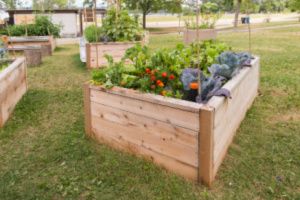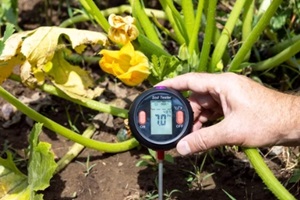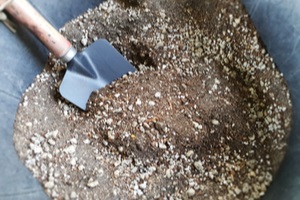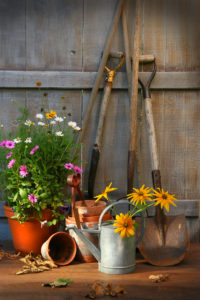Ultimate Guide to Creating the Perfect Raised Garden Soil for Optimal Plant Growth
 Are you looking to create the perfect raised garden soil for optimal plant growth? Look no further! In this ultimate guide, you will learn how to make nutrient-rich soil that will help your plants thrive. Whether you’re a seasoned gardener or a beginner, this guide is packed with expert tips and tricks to help you achieve the best results.
Are you looking to create the perfect raised garden soil for optimal plant growth? Look no further! In this ultimate guide, you will learn how to make nutrient-rich soil that will help your plants thrive. Whether you’re a seasoned gardener or a beginner, this guide is packed with expert tips and tricks to help you achieve the best results.
First, creating the right soil for your raised garden beds is essential. It provides the necessary nutrients and drainage that plants need to grow well. Next, we will explain the importance of using organic matter like compost and aged manure to enrich your soil and improve its fertility. Additionally, we will cover pH levels, soil texture, and the right mix of soil components to ensure your plants stay healthy.
With these steps, you will be well on your way to creating the perfect raised garden soil.
By the end of this guide, you’ll know how to create the perfect raised garden soil to support your plants throughout their growth cycle. Get ready to learn the secrets to a thriving garden!
Dirt Connections is a participant in the Amazon Services LLC Associates Program, an affiliate advertising program designed to provide a way for websites to earn advertising revenues by advertising and linking to Amazon.com.
Importance of Quality Soil for Plant Growth
 Quality soil is the foundation for a thriving garden. It gives plants the nutrients, moisture, and structure they need to grow. Rich soil with organic matter and balanced chemicals helps plants reach their full potential.
Quality soil is the foundation for a thriving garden. It gives plants the nutrients, moisture, and structure they need to grow. Rich soil with organic matter and balanced chemicals helps plants reach their full potential.
Good soil supports strong root development, helping plants absorb more water and minerals. This leads to healthier leaves, vibrant flowers, and plenty of fruits or vegetables. Poor soil can cause stunted growth, pests, diseases, and low productivity.
By creating the perfect raised garden soil, you are investing in your garden’s long-term success. A well-designed soil mix will nourish your plants and improve the health and resilience of your garden.
Understanding the Composition of Raised Garden Soil
Raised garden beds have several advantages, like better drainage, weed control, and easier access for gardeners. But the soil in these beds must be carefully prepared to ensure optimal plant growth.
The best raised garden soil is a mix of topsoil, compost, and mineral amendments. Topsoil provides the foundation for roots, offering structure and water-holding capacity. Compost enriches the soil with nutrients and supports beneficial microorganisms.
Mineral amendments like sand, perlite, or vermiculite enhance drainage, aeration, and nutrient availability. The specific ratio of these components depends on your plants’ needs and local soil characteristics.
Step-by-Step Guide to Creating the Perfect Raised Garden Soil
Creating the perfect raised garden soil takes several steps, but the effort is worth it. Follow these steps to get started:
- Assess Your Existing Soil: Check the texture, drainage, and nutrient content of your soil. This helps you decide which amendments to add.
- Choose the Right Raised Bed: Pick a bed size that fits your space and gardening needs. Make sure it’s made of high-quality, rot-resistant materials.
- Prepare the Base: Fill the bottom of a new raised bed with gravel or crushed stone to improve drainage and prevent waterlogging.
The Benefits of Using Non-GMO Seeds in Your Garden
Choosing non-GMO seeds for your garden offers numerous benefits. First, these seeds come from plants that have not been genetically altered, ensuring you grow plants as nature intended. Additionally, non-GMO seeds support biodiversity, helping maintain a variety of plant species. By using non-GMO seeds, you also support sustainable farming practices. This choice helps local farmers who prioritize natural growing methods. Furthermore, non-GMO plants often have better flavor and nutrition, enhancing your gardening and eating experience. By opting for non-GMO seeds, you contribute to a healthier environment and enjoy the true essence of gardening.
Mason Jar Soil Test Procedure
The mason jar soil test is an easy way to analyze soil composition. First, fill a mason jar one-third full with garden soil. Next, add water until the jar is almost full. Then, add a few drops of liquid dish soap to help separate the particles. Seal the jar tightly and shake it vigorously for several minutes. After shaking, set the jar on a flat surface and let it sit undisturbed for 24 to 48 hours. Over time, the soil will settle into layers: sand at the bottom, silt in the middle, and clay on top. By observing these layers, you can determine the proportions of sand, silt, and clay in your soil. This test helps you understand your soil’s texture for better gardening decisions.
Choosing the Right Organic Matter for Your Soil Mix
Organic matter is key to creating nutrient-rich, well-structured soil. The type you choose depends on your plants’ needs and local soil.
Compost is versatile and beneficial, made from decomposed plant and animal materials. It improves soil structure, increases water-holding capacity, and provides essential nutrients.
Aged manure is another excellent option, rich in nitrogen, phosphorus, and potassium. Ensure it has been properly composted to kill any pathogens.
Suggestions:
The PVP Industries PVP105408 Organic Perlite Planting Soil Additive is a 120-quart (4 cubic foot) product designed to enhance your gardening soil. This white perlite improves soil aeration and drainage, promoting healthy root development and plant growth. Ideal for organic gardening, it helps maintain optimal moisture levels and prevents soil compaction.
Reviews:
Organic Perlite is a natural horticultural soil additive conditioner, ideal for all plants. This 2-quart mix improves soil drainage and ventilation, promoting healthy root growth. Perfect for enhancing plant health, it ensures better moisture retention and prevents soil compaction.
Considerations:
Trifecta Myco Supreme is an ultra-concentrated mycorrhizal fungi root stimulator designed to promote strong roots and living soil. Ideal for tree, rose, and flower care, it enhances nutrient uptake and plant growth by forming beneficial relationships with plant roots. This powerful root stimulator supports robust and healthy plants, making it perfect for gardeners seeking to improve soil health and plant vitality.
Down to Earth Organic Bat Guano Fertilizer Mix 7-3-1, 4oz
Using Compost to Improve Soil Fertility
Compost is a gardener’s best friend. It improves soil structure and provides essential nutrients. Mix compost into your soil at a ratio of 30-50% compost to 50-70% topsoil and mineral amendments.
To enhance fertility, add a layer of compost on top of your raised bed each year. This replenishes the organic matter and nutrients used during the growing season.
Adding Mineral Amendments for Optimal Plant Nutrition
 Mineral amendments provide essential nutrients. Depending on your plants’ needs, consider adding:
Mineral amendments provide essential nutrients. Depending on your plants’ needs, consider adding:
- Perlite or Vermiculite: Improves aeration and drainage while retaining moisture.
- Sand: Breaks up heavy, clay-based soils to improve structure and drainage.
- Rock Dust or Powdered Minerals: Adds minerals like calcium, magnesium, and trace elements to balance nutrient levels.
Choose the right amendments to create a well-rounded soil mix for your plants.
Balancing pH Levels for Healthy Plant Growth
Soil pH affects nutrient availability. Most plants thrive in slightly acidic to neutral soil (pH 6.0-7.0).
- If soil is too acidic (below 6.0), add lime or wood ash to raise pH.
- If soil is too alkaline (above 7.0), add sulfur to lower pH.
Test your soil’s pH regularly and adjust as needed to ensure your plants can absorb nutrients.
Mulching Techniques to Retain Moisture and Suppress Weeds
Mulching enhances soil health. Apply a 2-4 inch layer of organic material like wood chips, leaves, or straw around plant bases. This retains soil moisture, suppresses weeds, and improves soil structure.
As mulch decomposes, it adds organic matter to the soil. Regularly replenish the mulch to maintain healthy soil.
Testing and Maintaining Soil Quality in Your Raised Garden
Maintaining soil quality is essential. Regularly test pH, nutrient levels, and organic matter content. Adjust your soil mix with lime, compost, or minerals as needed.
Monitor soil structure for compaction or waterlogging. Address issues by adding organic matter or adjusting watering practices. Stay proactive to ensure your plants thrive year after year.
Frequently Asked Questions (FAQs)
- How often should I test my soil? Test your soil at least once a year, ideally in early spring, before planting. This helps identify any nutrient deficiencies or pH imbalances.
- What are the signs of nutrient deficiencies in plants? Nutrient deficiencies can show up as yellowing leaves, stunted growth, poor flowering, or leaf discoloration. For example, nitrogen deficiency often causes yellow leaves, while phosphorus deficiency can result in purple or dark green leaves. Address these issues by adjusting your soil’s nutrient balance with appropriate fertilizers or amendments.
Soil Types and Drainage
- What is the best type of compost to use in raised garden soil? Use well-aged compost made from a mix of green and brown organic materials. This ensures a balanced nutrient profile and improves soil structure.
- How can I improve drainage in my raised garden beds? To improve drainage, mix in materials like perlite, vermiculite, or coarse sand. These additions help prevent waterlogging by increasing soil aeration.
pH and Compost
- How do I know if my soil’s pH is balanced? Use a soil pH testing kit, available at garden centers, to measure the pH level. Most plants thrive in slightly acidic to neutral soil with a pH between 6.0 and 7.0.
- How often should I add compost to my raised garden beds? Add a layer of compost to your raised garden beds at least once a year, preferably in the fall or early spring. This helps replenish nutrients and maintain soil health.
- What are some natural ways to fertilize my raised garden soil? Use organic fertilizers like compost, aged manure, bone meal, or fish emulsion. These natural options enrich the soil without the use of chemicals.
These FAQs cover essential tips for creating and maintaining the perfect raised garden soil. Test your soil annually and recognize nutrient deficiencies. Use the right compost and amendments to ensure your garden thrives. Remember to check your soil’s pH, add compost regularly, and opt for natural fertilizers. With this information, you’re well-equipped to enjoy a bountiful and healthy garden.
Tools and Materials Checklist
 To ensure a smooth gardening process, start with a complete tools and materials checklist. First, gather essential items like compost, perlite, and garden trowels. Additionally, you’ll need pH testing kits, watering cans, and mulch. Having these tools on hand saves time and prevents frustration. Furthermore, with the right materials, you’ll be ready to create and maintain the perfect raised garden soil. Moreover, being prepared ensures a more enjoyable and productive gardening experience.
To ensure a smooth gardening process, start with a complete tools and materials checklist. First, gather essential items like compost, perlite, and garden trowels. Additionally, you’ll need pH testing kits, watering cans, and mulch. Having these tools on hand saves time and prevents frustration. Furthermore, with the right materials, you’ll be ready to create and maintain the perfect raised garden soil. Moreover, being prepared ensures a more enjoyable and productive gardening experience.
For a successful gardening experience, having the right hand tools is essential. First, a sturdy garden trowel is great for digging and planting. Next, a hand fork helps loosen soil and remove weeds. Pruners are crucial for trimming and shaping plants. Additionally, gloves protect your hands from dirt and thorns. With these essential hand tools, you’ll be well-equipped to handle various gardening tasks efficiently.
Seasonal Tips
Gardening success often depends on adapting to the seasons. In spring, focus on preparing your soil for planting by adding compost and testing pH levels. Next, during summer, manage moisture and mulch to retain water and suppress weeds. Then, in the fall, enrich your soil with organic matter and plan for the next growing season. Finally, in winter, protect your soil with cover crops or mulch to prevent erosion. By following these seasonal tips, you can maintain healthy soil and ensure a thriving garden all year round.
Troubleshooting
 Even with the best preparations, gardening challenges can arise. For instance, to address poor drainage, incorporate perlite or sand into your soil mix. Additionally, if you notice nutrient deficiencies, such as yellowing leaves or stunted growth, adjust your soil with the appropriate fertilizers. Furthermore, for pest and disease control, use organic solutions like neem oil or insecticidal soap. Regularly inspecting your garden and addressing issues promptly will help keep your plants healthy and productive. Ultimately, troubleshooting common problems ensures your garden continues to thrive.
Even with the best preparations, gardening challenges can arise. For instance, to address poor drainage, incorporate perlite or sand into your soil mix. Additionally, if you notice nutrient deficiencies, such as yellowing leaves or stunted growth, adjust your soil with the appropriate fertilizers. Furthermore, for pest and disease control, use organic solutions like neem oil or insecticidal soap. Regularly inspecting your garden and addressing issues promptly will help keep your plants healthy and productive. Ultimately, troubleshooting common problems ensures your garden continues to thrive.
Helpful Videos and Books
 For further learning, explore helpful gardening videos and books. Watching instructional videos can provide visual guidance on soil preparation and planting techniques. Additionally, reading well-reviewed gardening books can deepen your understanding of soil science and plant care. For example, some recommended titles include “The Vegetable Gardener’s Bible” by Edward C. Smith and “Teaming with Microbes” by Jeff Lowenfels. By utilizing these resources, you support continuous improvement and success in your gardening endeavors.
For further learning, explore helpful gardening videos and books. Watching instructional videos can provide visual guidance on soil preparation and planting techniques. Additionally, reading well-reviewed gardening books can deepen your understanding of soil science and plant care. For example, some recommended titles include “The Vegetable Gardener’s Bible” by Edward C. Smith and “Teaming with Microbes” by Jeff Lowenfels. By utilizing these resources, you support continuous improvement and success in your gardening endeavors.
Enjoy the Rewards of a Thriving Garden with the Perfect Soil
Creating the perfect raised garden soil is an investment in time and effort, but the rewards are truly worth it. By following the steps in this guide, you will build nutrient-rich, well-structured soil that supports your plants.
First, choose the right organic matter and minerals, which are essential for providing your plants with the nutrients they need. Next, maintain ideal pH and moisture levels. Each step is crucial for a thriving garden. When you get your soil right, you set the foundation for a productive and beautiful garden.
So, roll up your sleeves, get your hands dirty, and start building the perfect raised garden soil. With patience and attention to detail, you will enjoy bountiful harvests and vibrant blooms in your healthy, thriving garden.
Transform Your Garden with Professional Raised Garden Soil Services
Creating the perfect raised garden soil is essential for achieving a thriving, productive garden. For homeowners in Maryland, Virginia, and the Washington DC metro area, opting for professional soil preparation services ensures that your garden beds are built with the highest quality materials and expertise. At Dirt Connections, we specialize in crafting nutrient-rich, well-structured soil mixes tailored to your specific gardening needs. By choosing our services, you set your plants up for success with a foundation that supports robust growth, healthy blooms, and bountiful harvests. Trust our team to deliver exceptional results that will enhance the beauty and productivity of your garden for years to come.
Maximizing Nutrient Retention in Your Raised Garden Soil
To maintain the nutrient-rich environment of your raised garden beds, regular soil testing and adjustments are crucial. Conduct a soil test annually to monitor pH levels and nutrient content, ensuring that your plants receive the optimal conditions for growth. Incorporate organic matter such as compost or aged manure into your soil mix each year to replenish essential nutrients. By taking these steps, you can sustain the health and productivity of your raised garden beds over time, leading to healthier plants and bountiful harvests.
Contact Dirt Connections for Expert Gardening Services in MD, VA, and DC
 Are you looking for a licensed and experienced service provider in Maryland, Virginia, and the Washington DC metro area? Look no further! At Dirt Connections, we pride ourselves on offering superior service for all your gardening and landscaping needs, including bush hogging, grading, site clearing, and landscaping.
Are you looking for a licensed and experienced service provider in Maryland, Virginia, and the Washington DC metro area? Look no further! At Dirt Connections, we pride ourselves on offering superior service for all your gardening and landscaping needs, including bush hogging, grading, site clearing, and landscaping.
Whether you’re starting a new project or maintaining your current garden, our team of professionals is here to help. We have the expertise and dedication to ensure your garden thrives with the best possible soil and care.
If you are serious about achieving outstanding results, contact us today. Fill out the form adjacent to this blog to get in touch with our team. Let Dirt Connections provide you with the exceptional service you deserve.
We look forward to helping you create a beautiful and productive garden. Thank you for considering Dirt Connections for your gardening and landscaping needs.
Summary

Dirt Connections was started with one goal in mind: providing quality residential and commercial construction services to clients on time and on budget. Reach out for more information on how we can support your next project.
For your convenience our estimates are free and by appointment. Call 703-940-9949 for a free estimate today!










































